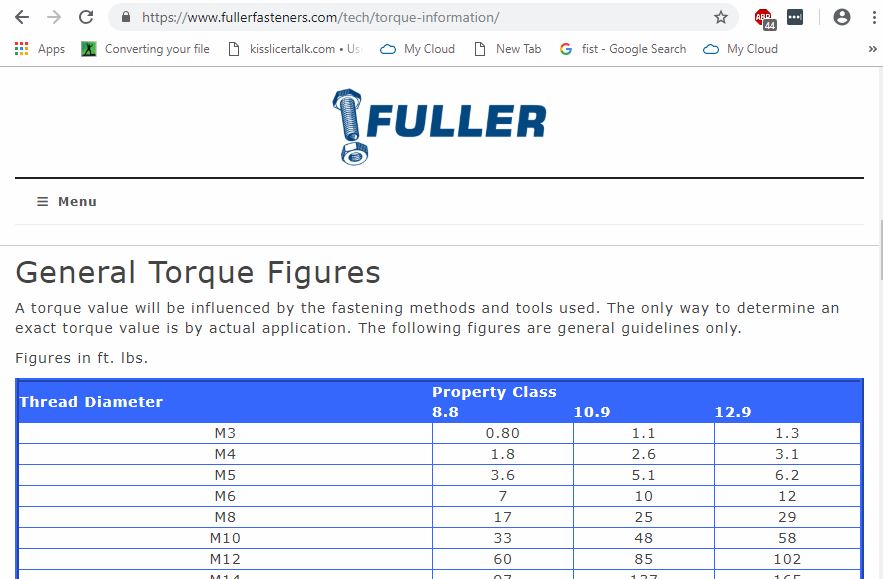Easily Stripped Parts
I received my i3 mk3 kit just over a week ago. When I went to assemble it I found it was really easy to strip the metal screws and plastic parts. In fact I stripped several of the metal screws and two of the plastic parts on just the first step, assembling the y-axis. I have assembled many things over the years, and I never had this problem.
Some, or probably many, will say I ham-fisted the screws. I'm pretty sure I didn't, especially on the plastic part where I was using two fingers to spin the shaft of the allen key (super minimal force). However, this time I wanted to be sure, so I ordered a torque driver while waiting for replacement parts. It wasn't the most expensive model I could find, but it seemed well rated and liked (and was mentioned on these forums). The included calibration sheet said it was only off by 1 lb-in at 40 lb-in. I also tested it on a couple screws that I knew had been set to a known value, and it seemed accurate enough, though I'm the first to admit it wasn't a very scientific test.
Tonight I reassembled the metal frame (the first few steps of part 2, y-axis). Of the 32 screws, only 5 survived at the recommended 40 lb-in. The other 27 started to strip before the driver clicked. These were completely new screws (customer support sent an extra screw bag too). If I had to guess, I would say the upper limit for many of these screws was around 36-38 lb-in, which is probably close enough...
Did the team consider torx over hex? Apologies if I'm bringing up a great debate. I did a search in the mk3 assembly instructions and didn't see anything mentioned. Also, would a higher quality screw have helped, or are these really good quality? They seem a bit "squishy" compared to the steel screws/bolts I normally use. The bit/key getting stuck on almost every screw with almost no force applied (guessing under 20 lb-in).
I will start attaching the plastic parts again on Wednesday when the second replacement piece arrives. I'm going to be far more careful this time. However, I'm still concerned the metal nuts will strip the plastic sockets being used as wrenches. Did any of the designs ever call for a wrench or metal socket to hold the nut while screwing in the bolt? Yes, it is an extra tool, but it is a much better experience.
Finally, I want to give a shout out to Prusa customer support. That team is amazing. They sent two replacement plastic parts really quickly and tossed in an extra step 2 metal parts bag just because I mentioned the screws were really soft and easily stripped.. It added some delay to the build, but I'm still very impressed with how well Prusa treats customers. Thank you!
Re: Easily Stripped Parts
Good Morning James,
what did you try to torque to 40 lb-in?
as far as I can see, 3mm screws should be tightened to about 0.8 ft-lb which would be about 9 in-lb max
and that would be metal to metal, plastic would be lower
regards Joan
I try to make safe suggestions,You should understand the context and ensure you are happy that they are safe before attempting to apply my suggestions, what you do, is YOUR responsibility.Location Halifax UK
Re: Easily Stripped Parts
what did you try to torque to 40 lb-in?
as far as I can see, 3mm screws should be tightened to about 0.8 ft-lb which would be about 9 in-lb max
and that would be metal to metal, plastic would be lower
regards Joan
Step 2 of the assembly guide, https://manual.prusa3d.com/Guide/2.+Y-axis+assembly/507?lang=en
You can tighten the M5x16r with included Allen key or with a Torque Wrench. Recommended torque is 4.5 N.m (40 lb-in).
I was not trying to put that much torque on the plastic pieces.
Re: Easily Stripped Parts
Joan is right; M3 fasteners into metal should be under 10 inch pounds (0.8 newton meters) on the Weller wrench I recommended this is right down at the bottom of its adjustment scale )
Re: Easily Stripped Parts
Looking at the chart, it says 3.6 ft-lbs for M5 screws. That converts to 43.2 in-lbs, so it looks like 40 in-lb is about right.
